Wednesday Feb 25, 2026
Wednesday Feb 25, 2026
Monday, 29 February 2016 00:00 - - {{hitsCtrl.values.hits}}

From left: ICS Sri Lanka Branch Secretary Anoma Ranasinghe, Deputy Minister of Public Enterprise Development Eran Wickramaratne, ICS Sri Lanka Branch Chairman Lalith Witanachchi, Speaker of the Parliament Karu Jayasuriya, Minister of Ports & Shipping Arjuna Ranatunga and ICS Sri Lanka Branch Vice Chairman Manjula Agalawatta
Lalith Witanachchi, the President of Sri Lanka Branch of the Institute of Chartered Shipbrokers, UK, has called for a vibrant consultative mechanism to boost the country’s shipping and ports sector.
He made this and several other key recommendations during his address at the 22nd Annual Awards ceremony of the Institute, at which the Chief Guest was Speaker Karu Jayasuriya whilst Ports and Shipping Minister Arjuna Ranatunga and Public Enterprise Development Deputy Minister Eran Wickramaratne were also present.
Following are excerpts from Withanachchi’s speech:
It is my pleasure to welcome you all this evening to the 22nd Annual Awards Ceremony; the flagship event of the Sri Lanka Branch of the Institute of Chartered Shipbrokers ,UK, and also an important event in the shipping almanac of the local industry.
I feel particularly honoured to have the presence of the Speaker of the Parliament as our Chief Guest this evening and also the 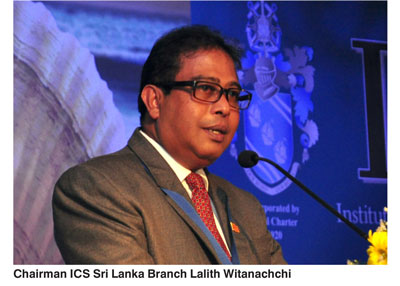 presence of Hon Arjuna Ranathunge – and Hon. Eran Wickramaratne.
presence of Hon Arjuna Ranathunge – and Hon. Eran Wickramaratne.
Ladies and Gentlemen, Hon. Karu Jayasuriya, is the senior-most member of the ICS Sri Lanka Branch and was the first Asian to be bestowed with the honour of being the Chief Guest at the International Awards Ceremony of the Institute of Chartered Shipbrokers, UK, which event was held in London, a few years ago. Today, we are indeed proud to note that one of our members; a true professional who takes pride in living up to the spirit of the ICS motto ‘OUR WORD OUR BOND’, in word and indeed, is aptly appointed as the Speaker of the Parliament and what a great honour it is for us to have him as our Chief Guest this evening.
Sir, may I mention that, the consistency you have shown in attending our Annual Awards Ceremonies despite your busy schedules is exemplary. Thank you Sir, for graciously accepting our invitation for this evenings Award ceremony.
Hon. Arjuna Ranatunge, it is our privilege to have your distinguished presence this evening. May I humbly submit Sir, you have assumed command of the local shipping industry as its subject minister, at a crucial juncture when the industry is starving for proper leadership and guidance. Of course, there is no doubt a challenging task is ahead of you. But then, you are well-known to be a strong willed person and also known to take challenges head-on with great success. My mind swiftly rewinds back to your cricketing days in the year 1996 when you astutely lead with great courage and determination a young Sri Lankan team – who were the under dogs - steam rolling your opponents to emerge victorious and win the World Cup for Sri Lanka. With age, I am sure those inherent characteristics have also matured in you like vintage scotch and wine.
As you all know the maritime industry is considered the lifeblood of International trade and global economy. More than 90% of world merchandise from raw material, machinery, equipment to consumer goods estimated to be around 9 billion tons annually are carried by ships across the oceans. The maritime commercial shipping has now achieved a high level of efficiency for low cost movements of goods immensely contributing to economic globalisation.
In Sri Lanka’s perspective, the country being an Island nation and its economy to a greater extent depending on import and export trade, primarily an efficient and cost effective maritime connectivity is undoubtedly an important pre-requisite for the overall economic progress of the country.
It is also important that we have to make more economic use of the country’s strategic geographical location promoting it as the ‘maritime hub’ in the Region. There are, a wide range of maritime related business activities such as transshipment, ship building, and repairs, logistic centers, Ship Management, Maritime education, Marine Insurance, Surveyors and brokering, Financing etc., which can be attracted and promoted in maritime centers across the island by creating pro-business policy environments.
One vital area which draws attention is the continuous development of human skills. Technological developments in the sea transport sector over the past few decades, especially in terms of containerisation, have stressed the necessity to recognise this fact and act positively in this all important area. In this respect, one thing remains pertinent – the need for focused and relevant training; capable of attracting high-quality and talented individuals who see shipping for what it is – an important, vibrant and growing industry. 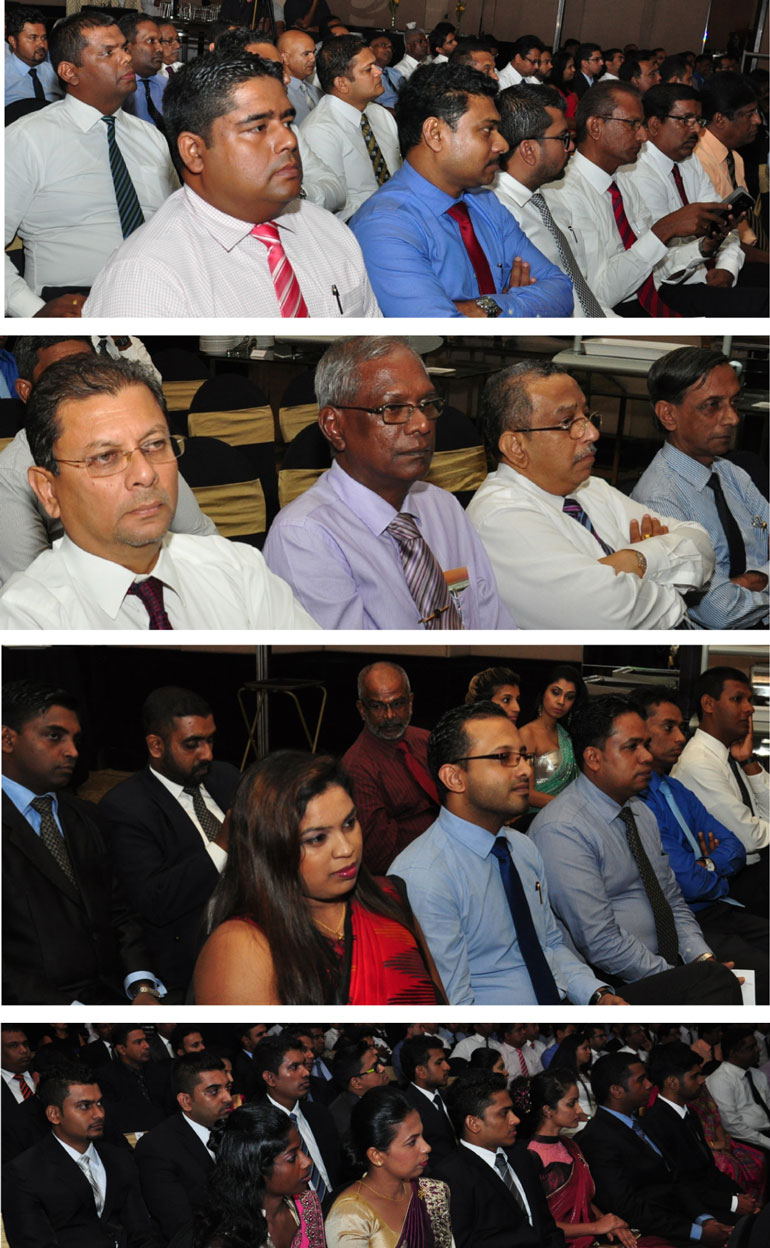
Sir, over the last hundred years the Institute of Chartered Shipbrokers - UK has earned an unmatched global reputation from the International Shipping Industry’s major players as the only professional body dedicated to commercial shipping worldwide. The post-nominal initials MICS & FICS make a point of difference in very difficult and ever changing service sector, which remains dependent on the knowledge and trust of its key decision makers. Governments across the world are seeking specialist ICS opinion on relevant shipping issues.
Hon Minister, in the context of the local shipping industry, the need of the hour is for the state administrative machinery to have in a place a vibrant consultative mechanism or forum comprising shipping professionals to provide appropriate advice to them to formulate effective solutions with issues related to shipping. It reminds me to recall that in the year 1996 the then Minister of Shipping; Late Mr. Ashroff appointed a taskforce for the formulation of a National Shipping Policy for Sri Lanka. Mind you sir, this is a point we have 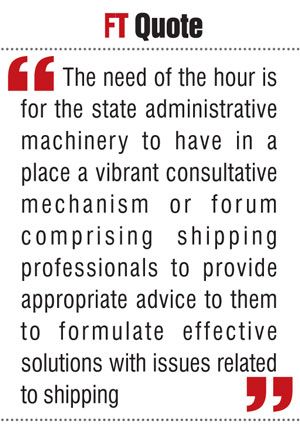 been repeating every year at our Awards Ceremony. The contribution made by ICS Sri Lanka Branch as a Member of the Task Force was immense and significant. Unfortunately however, due to his sudden demise the document never saw the light of the day.
been repeating every year at our Awards Ceremony. The contribution made by ICS Sri Lanka Branch as a Member of the Task Force was immense and significant. Unfortunately however, due to his sudden demise the document never saw the light of the day.
Today, we could proudly boast of having a port with 3 Terminals, including the deep draft terminal, with an annual capacity of 2.5 million TEU’s, which is capable of accommodating MEGA ships which are now being inducted into shipping services which of necessity require deep draft facilities.
Moreover, shipping companies are facing challenging times with vessel over capacity and still new ships being added to services and having to compete for less cargo volumes causing very depressed freight levels. Resultantly, ship-owners/operators are demanding more productive, cost efficient and quality port services. The Terminal operators have to understand these circumstances when making their policies and strategies.
Sir, as a professional body, we are ever so willing and readily available at your disposal to extend whatever possible assistance you may need in steering the future course of the Sri Lanka Shipping Industry under your astute leadership.
Hon. Minister, these are just a few thoughts I embarked upon to share with humility but there are many more for which neither the time nor this forum is appropriate. However, let me once again humbly re-iterate that ICS Sri Lanka is always available to share our expertise in the broader interest of the development of our own shipping industry.
To all of you who will be receiving your Diplomas, Membership and Awards tonight, I wish to mention, that the single most important factor in the Shipping Industry is the Individual. Professionally qualified individuals are better placed to make better decisions on behalf of themselves, their Companies and their clients.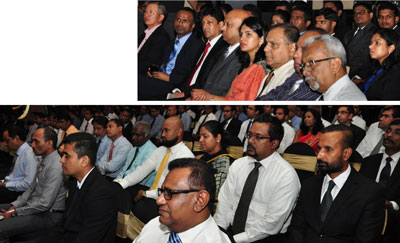
Professionalism couples, a comprehensive understanding of one’s business with trust and integrity. ICS members combine the knowledge gained through study and proven through examination with business ethics that Imports confidence into the Industry Worldwide and epitomise themselves as genuine professionals.
Finally, let me wish the recipients of Awards all well and request them to maintain the highest standards of ethics in their thoughts and action as a true professional and always live up to the Institute’s motto “Our word our bond”, indeed a hallmark of professionalism in this global Industry.
Thank you!

Speaker Karu Jayasuriya recently made a case for a national advisory body to properly develop the shipping and maritime sector to achieve desired results.
Speaking as the Chief Guest at the 22nd Annual Awards of the Sri Lanka Branch of the Institute of Chartered Shipbrokers – UK, 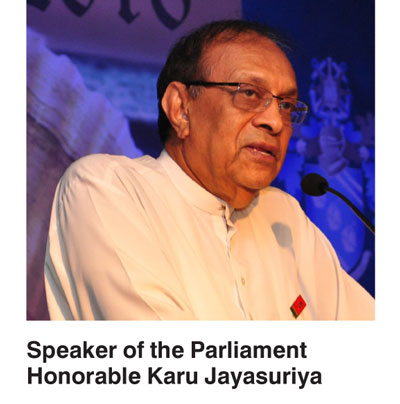 Jayasuriya said the country’s ports industry faced many challenges.
Jayasuriya said the country’s ports industry faced many challenges.
“The maritime industry involves various inter-dependent functional areas such as Government policy initiatives, regulatory frameworks, port infrastructure, shipping, maritime education and maritime environment protection. Currently various government agencies are independently assigned to handle these inter-dependent functions. Should there be a National Advisory Body comprising maritime experts to guide these agencies in maritime matters of national importance in a well coordinated and prudent manner? The National Shipping Board of India can be cited as an example,” said Jayasuriya.
Following are excerpts from Speaker Jayasuriya’s address.
Ladies and gentlemen, as the senior most Chartered Fellow of the Institute, I carry the rare distinction and honour of gracing this prestigious event annually without an interruption for close upon two and half decades.
The global and Sri Lankan Maritime Industry is going through challenging times. Freight rates for the carriage of a 20-foot-container from Asia-Europe has dropped to about $ 400. As it was stated recently, shipping lines are in fact paying to carry the cargo.
The number of container ships idling without employment which includes an ultra large container carrier of 18,000 TEUs have zoomed up to 1.3 million TEUs. With the supply and demand imbalance, obviously more idle capacity is required for the freight rate to recover. The massive over capacity, weaker trade demand and low freight rates have plagued the global container shipping industry.
The global shipping woes do not stop there. There is a growing feeling that this year will be the year that finally sees significant consolidation taking place in the liner shipping industry and before too long existing container shipping alliances are expected to break up.
Falling oil prices are giving a new twist to the concept of economies of scale. Lower bunker prices may well give a new lease of life to smaller vessels which at current charter rates can compete on costs with vessels twice their size on trades that cannot sustain the largest vessels. There is a clear cost saving from increasing service speed and reducing the number of vessels per loop.
In the light of the above many questions are being raised in regard to our ports and shipping sector. The launch of the 2nd phase of the Hambantota port at a cost of well over $ 1 billion, will it result in surplus container capacity? Is this development sustainable for a developing nation like Sri Lanka?
Moreover, if sufficient domestic demand for ports does not exist, developing port capacity for transhipment purposes is a risky business because of the foot loose nature of the container. As it has happened in the past before too long, you could find yourself with ghost port terminals in your hands. I am sure the Minister of Ports will address these issues.
The Sri Lankan Ports Industry faces many challenges. Unlike in the past where there were 25 individual top container carriers, currently container shipping is dominated by four mega shipping alliances controlling approximately 90% of the shipping capacity. Global shipping lines prefer to work with global port operators. The tremendous increase in the through-put achieved by a global operator in the port of Colombo in a short space of time bears testimony to this fact.
I have repeatedly made a call at this forum for the revival and revitalisation of our national merchant fleet. We are aware that the Ceylon Shipping Corporation has purchased two brand new bulk carriers for the carriage of coal. Unfortunately I am told that these vessels have been purchased at a time when the daily operating cost of the vessel is greater than the daily revenue or the market rate that is achievable. Maritime industry involves various inter-dependent functional areas such as Government policy initiatives, regulatory frameworks, port infrastructure, shipping, maritime education, maritime environment protection.
Currently various Government agencies are independently assigned to handle these inter-dependent functions. Should there be a National Advisory Body comprising maritime experts to guide these agencies in maritime matters of national importance in a well coordinated and prudent manner? National Shipping Board of India can be cited as an example.
In addition to port operations and ship owning, maritime industry includes a wide range of other maritime or related business enterprises such as, ship building and repairs, logistics centers, ship management, insurance, surveyors, brokers, financiers and marine lawyers.
The strategic location of the country is ideal for such diverse businesses which have to be attracted by creating a competitive and pro-business policy environment for start-ups and expansion.
Studies should be undertaken to see what benefits could be achieved by promoting to register foreign owned ships in Sri Lanka striking the right balance between regulatory and commercial necessities. The countries such as Panama, Uberi Marshall Islands, Hong Kong and Singapore have successfully implemented the ship open registry. This will facilitate Sri Lankan seafarers to secure employments and also the economy with fees, taxes and services from the registered ships.
Having said all above, for an industry to move forward there has to be professionalism and technical know-how, which is what is being offered at the Institute of Chartered Shipbrokers through its globally recognised qualifications.
Let me conclude by saying that educating and training your staff is investing in people and this shows a commitment that we value them and are willing to spend money on them. A famous anecdote on this subject; the Financial Director questions the HR Director, ‘What happens if we train our staff and they leave?’ and receives the reply ‘What happens if we don’t and they stay?’ The truth is, with all else being equal, our people are much more likely to stay with a company that invests in them.